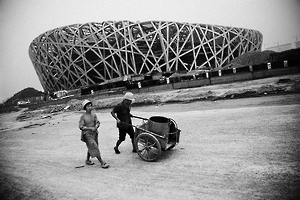The State Council has released new guidelines directing local governments to allow migrants from the countryside permanent residency in cities where they live and work. In effect since 1958, China’s household registration—or hukou—system has long been controversial for limiting migrant workers’ access to public services in the cities where they reside, and for creating a cohort of nearly 61 million “left-behind children.” The AP reports on the directed hukou reforms, which will take effect on January 1, 2016:
Chinese citizens have for decades been limited in public services they can access by their household registration, known as a hukou (”who-co”). The problem is especially acute for the millions of migrant workers who are often forced to either leave their children in the countryside or place them in unregistered and often sub-standard schools in the city.
While various cities have implemented incremental reforms, the move announced Saturday will relax the rules on a national basis and reduce opportunities for corruption and irregularities.
Migrants can apply for a residency permit if they have lived in the city they are applying in for a certain time and have a stable job, place to live or are studying, a statement posted on the Cabinet’s official website said. Permits will enable them to access benefits including basic health care and children to have nine years of compulsory education.
While all cities must follow the new policy, cities can enact their own regulations according to “local conditions,” the Cabinet said. This is likely to mean that big cities like Beijing will continue to be encouraged to control their population and have more stringent criteria for residency. [Source]
The Wall Street Journal’s Esther Fung reports on other policy efforts to continue encouraging urbanization while limiting further influx to overpopulated first-tier cities:
Encouraged by Beijing, some local governments are rolling out a range of housing subsidies, tax waivers and lower mortgage rates to attract new residents. In Fuyang, an urban district near the well-off eastern provincial capital of Hangzhou, the government is providing a one-time housing subsidy of as much as 800,000 yuan ($123,874) for new residents with certain qualifications who buy homes in the area. The central city of Luoyang is subsidizing deed tax payments and mortgage costs for rural migrants buying homes in the city.
The push by Beijing is intended to address a problem that has cropped up in recent years as people leave the countryside for the cities for work: Most want to go to the largest, most prosperous cities, putting a strain on infrastructure and services in those places. Meanwhile, large parts of the rest of the country are overbuilt.
[…] Many of these subsidies are temporary, lasting only a few months as questions remain on how local governments could raise money to foot the bill for these costs. Some local governments have also asked state-owned firms and financial institutions including policy banks to help with these costs. [Source]
Living even further to the margins of society than China’s 250 million migrant workers are the 13 million hukou-less citizens born in violation of the recently reformed one-child policy. Following a promise last week from central authorities that all citizens would be granted the right to registration, The Wall Street Journal’s Marco Huang interviews one such unregistered woman on her reaction to the announcement:
WSJ: The government just announced at a meeting led by President Xi Jinping that it plans to grant hukou to unregistered people. What kind of impact do you think this will have?
Ms. Li: To be honest, when I first saw the news, I had mixed feelings. My hope is that no matter who said this, they match their deeds to their words. In my 22 years, I’ve heard of various legal revisions and new policies, but I’ve yet to experience the changes in reality.
WSJ: What would you most like to do if you successfully get a hukou?
Ms. Li: I hope I can be like my older sister. Even though she dropped out of school in junior high to support our family, she continued studying on her own and earned an adult self-study diploma (through a government program launched in 1981).
Since I’m already 22, it’s impossible for me to go back to school to complete my nine years of compulsory education. But I hope I can take some kind of exams like she did and earn a diploma. Maybe it’s not too realistic to hope of becoming a lawyer, but at least if I have a diploma, I can go look for some kind of job. Right now, without a hukou, I can’t do anything. […] [Source]
Also see coverage from Reuters of activists’ call for Beijing to grant citizenship to the more than 20,000 stateless children of trafficked North Korean women currently living in China. For more on the hukou household registration system and the long road to its reform, or the one-child policy and its recently enacted reforms, see prior coverage via CDT.







